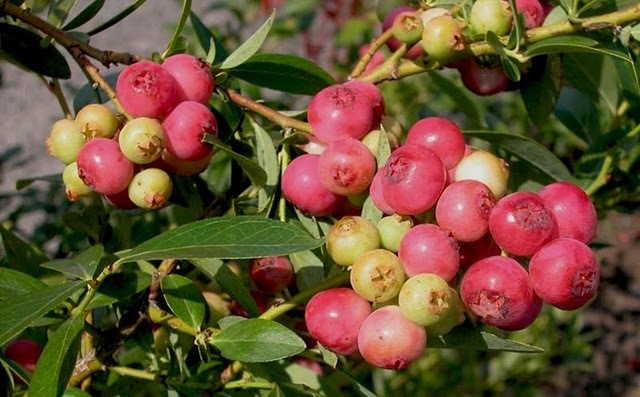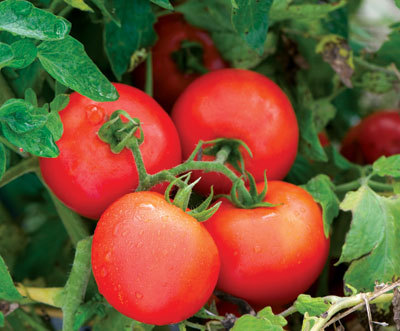Nancy and I have been putting together our orders for spring planting this year. Some of the items we are trying are just for curiosity, while others seem to be improvements over what is available in the market.
One of the big curiosity plants is “Pink Lemonade” blueberry, which showed up for the first time in a number of catalogs. It is, according to the White Flower Farm catalog, “creating quite a stir among backyard gardeners.”
The high-bush blueberry is supposed to have pinkish-white flowers early in the spring, green berries that slowly turn to pink as the season progresses, fall foliage that starts yellow and then turns orange, and reddish-brown twigs for winter. The berries are described as sweet and flavorful.
This plant raises a number of questions, not the least of which is: Can you call it a blueberry if it has pink berries?
And, if this is such a hot plant, why aren’t the local nurseries selling it? Possibly, since the plant was introduced in 2009 at Briggs Nursery in Elma, Wash., all the stock was grabbed by companies closer to Washington. Or it could be that the local nurseries think it might not do that well in Maine.
It is supposed to be hardy to Zone 4 — most of Maine — and grow to about 5 feet tall and 7 feet wide. It is self-pollinating, but as with most blueberries, you will get better production if you have several plants.
The Facebook page devoted to the plant has a lot of people excited about it, but most had a crop of just a few berries — to be expected for a plant’s first year, especially since some of them arrive in 3-inch pots. And local nurseries sell their high-bush blueberries in larger pots.
So we’ll let you know how it goes. If it doesn’t work, you can save your money. If it does work, I’ll have a hot new plant early.
I have much more faith in the Defiant PhR (F1) tomato introduced by and exclusive to Johnny’s Selected Seeds in Winslow.
Remember two summers ago when the rain in Maine was a real pain and tomato crops got hit with late blight, the cause of the Irish potato famine?
This variety of tomato has a high resistance to late blight and intermediate resistance to early blight, according to Johnny’s catalog description.
The 6- to 8-ounce globe-shaped fruits have deep red internal and external color and come on high-yielding, medium-size plants. They are determinate, which means they are bushier than indeterminate, can grow with or without support, and ripen over a short period of time.
We have a lot of leftover tomato seed from earlier years, and the plan was to use up the old seed. This one I couldn’t resist, even though 20 seeds will cost $4.95. That’s close to 25 cents a seed.
We also are trying some new seeds from Renee’s Garden out of Felton, Calif. The company offered to send us some seeds to test, and (I’m repeating myself) I couldn’t resist.
Part of this is our desire to do more container gardening. We really liked “Bright Lights” Swiss chard, an earlier introduction from Johnny’s, and we wanted to grow some chard on our patio. Renee’s had a variety called “Pot of Gold” specifically designed for containers, so why not?
Herbs work better in containers close to the kitchen, and they have a container herb garden that includes basil, chives, oregano, cilantro and parsley, so we figured we would try that. We also couldn’t resist a tricolor carrot mix called “Circus Circus” and a Japanese cucumber, “Tasty Green.”
Some flower introductions include a bicolor “Royal Flush” sunflower, nasturtium “Buttercream,” and zinnias “Bling Bling” and “Little Lion.”
Since I keep trying new things in the vegetable garden, we keep running out of space. That means we should go higher.
Gardener’s Edge — which is the backyard gardener’s catalog for A.M. Leonard Tools — has a spiral veggie cage that can go up to 7 feet tall. We have been using 3-foot-tall metal cages for our tomatoes and a 4-foot-tall roll-up fence for our peas. That isn’t enough height for the sugar snap peas and some of the taller-growing tomatoes, so I jumped on this.
The price is $9.99 for one, but it goes below $8 each if you order three, so we did. I’ll test them, and if it works out, we will order more for next year.
We also ordered Amsonia hubrichtii (Arkansas narrow leaf blue star), the Perennial Plant Association plant of the year, from Plant Delights Nursery in North Carolina. It sounds interesting, and when it was announced as the PPA winner, I had not seen it in any local catalogs. Plant Delights has a wittily-written catalog with interesting plants, but the prices are higher than most, and owner Tony Avent seems to exaggerate a bit on plant hardiness. But he has support on this one, so we splurged.
Staff Writer Tom Atwell can be contacted at 791-6362 or at:
tatwell@pressherald.com
Send questions/comments to the editors.



